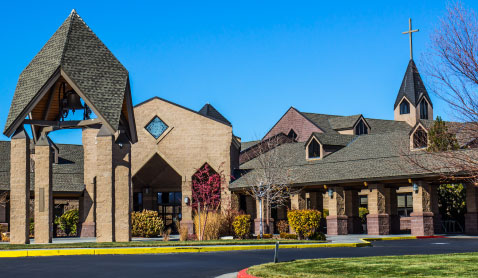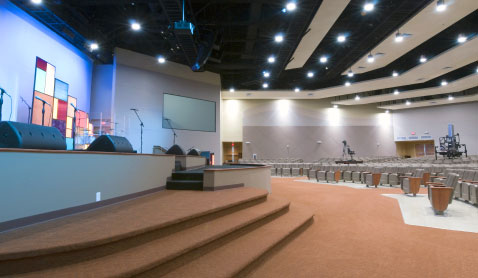Virginia Beach Church, Ministry, and Nonprofit Lawyers
Churches, ministries, and nonprofits often start out as small organizations. Over time, they may grow in size and complexity, adding schools and other forms of community service to further their mission. Leaders of these institutions rarely receive business training in seminary, yet, as their outreach grows, many of their responsibilities are business-related. Pastors may benefit significantly from obtaining professional guidance as they navigate drafting bylaws, choosing board members, paying taxes, hiring staff, and confronting other legal challenges. Our church law attorneys leverage their corporate and ministerial experience to help pastors and leaders of nonprofits in all 50 states understand their rights and apply best practices to operate their organizations confidently and effectively.
Why Do Nonprofits Need a Church Law Attorney?

Churches and ministries are part of the larger category of nonprofits. Typically, these organizations are founded by dedicated people committed to a cause, not to making a profit. In reality, the day-to-day business of running a church or other nonprofit is quite similar to running a corporation. Nonprofits, and churches in particular, need a church law attorney with corporate experience to help them understand how the legal system affects their work and what they need to do to protect the ongoing interests of their institution.
A qualified church law attorney can help nonprofits adopt business practices in a variety of areas, including the following:
- Drafting bylaws
- Filing articles of incorporation
- Protecting assets
- Selecting board members
- Complying with discrimination and employment laws
- Understanding tax law and exemptions
- Dealing with zoning restrictions
Churches and ministries can benefit from the guidance of an attorney who understands how to align business practices with their religious beliefs. A church law attorney can also answer questions that may arise concerning the impact of Supreme Court rulings and Constitutional protections on their day-to-day operations.
How is Anchor Legal Group, PLLC Different from Other Legal Services?
Anchor Legal Group, PLLC is different than other law firms and online services because we offer clients much more than a package of off-the-shelf documents. Our attorneys form long-lasting relationships with churches and ministries, remaining on-call to provide professional legal counsel throughout the life of each organization as it grows and changes. Our team includes an ordained pastor and attorneys with corporate experience. We serve as corporate counsel for denominations with thousands of churches. We have also helped churches of all sizes in a wide range of legal matters.
The average size of a church in America is about 100 members. Many churches are smaller than that. However, as these churches grow in size and complexity, perhaps expanding to two or more campuses, their exposure to liability increases, along with the value of their assets. Anchor Legal Group, PLLC provides professional guidance in spreading out that liability to protect the longevity and viability of the organization.
Clients nationwide look upon our attorneys as authorities in church law. Our tenure as law school professors and our long-term association with international religious broadcasting networks enable us to leverage contacts with other attorneys across the country to deliver our legal services in each state. These professional contacts enable us to meet the needs of churches and ministries coast-to-coast. Our goal is not to change the doctrine of a denomination but to help it stay in compliance with its policies and beliefs.
What Legal Mistakes Do Churches Often Make?
One of the biggest mistakes that churches often make is believing that it is somehow unspiritual to know one’s legal rights. Laws of the land apply to churches, ministries, and nonprofits whether their leaders understand them or not. Understanding the legal system can help churches further their mission. Failing to understand the law can lead churches to commit other mistakes, including the following:
- Remaining unincorporated
- Using bylaw templates without tailoring them to their specific needs
- Failing to document religious beliefs and practices in writing
- Choosing the wrong board members
- Not understanding tax law, zoning ordinances, and Constitutional protections
Remaining unincorporated is likely one of the most serious errors a church can make. A church law attorney can help create a structure around the church that will protect it and its leaders from exposure to liability. Drafting appropriate bylaws, establishing a board, and capturing beliefs and practices in writing are all important elements of becoming incorporated.
Why Should Churches Become Incorporated?

An unincorporated nonprofit association has no legal existence apart from its members. When churches are not incorporated, pastors, elders, and/or trustees may be held personally liable for back taxes, debts, or other liabilities. Furthermore, if a church is not incorporated, the court may have to approve any decision to buy or sell church property. Churches should become incorporated for several reasons:
- Pastors, trustees, and other leaders of incorporated churches are not personally liable for church debts
- An incorporated church can govern itself under its own written bylaws
- An incorporated church can buy and sell property and sign contracts in its own name
State laws define what it means to be an incorporated church. State laws also prescribe rules and regulations for unincorporated churches and nonprofits. Either way, the church is subject to the law. Anchor Legal Group, PLLC firmly believes that the benefits of incorporating make it clear that all churches should consider becoming incorporated.
What are Bylaws and How Should Churches Create Them?
Bylaws are legal, written guidelines governing an organization’s internal affairs. Definitions found in bylaws include the following:
- The official name and purpose of the organization
- Requirements for membership
- Titles, roles, and responsibilities of officers and/or board members
- The way in which officers are chosen
Churches should create bylaws with extreme care, seeking professional legal guidance from attorneys who understand complex business law, as well as church law. Many churches use off-the-shelf templates to create bylaws. While these documents may satisfy basic legal requirements to get the church started, they often fail to align with the polity of that individual church and all of the nuances of federal, state, and local regulations.
Church polity specifies how an individual church is connected with its denomination. For example, some denominations are congregational, where each congregation is individual and self-supporting. Other denominations are governed by a hierarchy of bishops; episcopal polity, or assemblies; presbyterian polities, which can exercise a larger degree of authority over individual congregations.
Bylaws have the force of law, making them different than other policies or procedures. However, failing to align bylaws with church policy can cause problems, such as:
- Organizations that violate their bylaws may face court challenges.
- Churches, ministries, and other nonprofits must file their bylaws with the secretary of state in which they are registered or incorporated.
For these reasons and more, it is imperative for churches to take the task of drafting and reviewing bylaws seriously. Anchor Legal Group, PLLC has helped thousands of churches draft legally sound bylaws that are designed to carry their organizations well into the future.
Asset Protection
Churches, ministries, and nonprofits are similar to any business in that they may someday be the target of a legal complaint. A lawsuit filed by a disgruntled employee or a person injured on church property may easily wipe out the assets of a church. Incorporation protects pastors, board members, and trustees from personal liability in the event of a lawsuit. However, when a church grows and expands into different areas, it is often beneficial to modify its legal structure to protect its assets. Using a single-member limited liability company (LLC) for each initiative can help churches protect their assets. For example, a church which operates a Christian day care school and food pantry may benefit from creating separate LLCs for the school and the food pantry. If one entity becomes the target of a lawsuit, the church and the other LLC may remain isolated from liability.
What Do Churches Need to Know About Taxes?

The first thing that churches need to know about taxes is that the Internal Revenue Service (IRS) automatically views them as exempt from federal income tax. That is because the First Amendment of the U.S. Constitution states that Congress shall make no law respecting the establishment of a religion or prohibiting the free exercise thereof. However, churches may opt to file Form 1023 to obtain supporting documentation that the IRS considers them a 501(c)(3) nonprofit organization. Ministries such as religious schools or humanitarian outreach programs can also file for tax exempt status under IRS Section 501(c)(3).
Other important facts that churches need to know about taxes include the following:
- Churches are generally exempt from state and local income and property taxes
- Churches are responsible for payroll taxes
- As a tax-exempt entity, churches have certain fiduciary responsibilities
A fiduciary is essentially anyone who is entrusted to act on behalf of another.
Importance of Choosing Board Members Who Fulfill Fiduciary Duties
Because church members donate their money to keep the organization running, board members who manage the business of the church automatically assume traditional fiduciary duties. These include but are not limited to the following:
- Duty of care: Financial decisions must be well-informed and made in good faith
- Duty of loyalty: Board members must disclose conflicts of interest; having a written Conflicts of Interest policy is the best way to clarify what this means
In addition, board members have a duty to obey all federal, state, and local laws, as well as church bylaws. All too often, churches choose board members simply because they volunteer for the job, and not always because they are well-qualified to fulfill fiduciary duties. Choosing board members with past criminal convictions, for example, may expose the church to liability.
Churches can benefit from contacting Anchor Legal Group, PLLC to inquire about training sessions to educate board members about their fiduciary responsibilities. Training may include a review of best practices in creating financial statements, transaction disclosures, and oversight procedures, as well as the use and management of resources.
Employment Issues and Constitutional Protections
In June 2020, the U.S. Supreme Court ruled that it is illegal for an employer to fire a worker because they are gay or transgender, leaving the ministerial exception undefined. The ministerial exception is a constitutional protection for churches and other religious organizations that is meant to prohibit the government from interfering in the hiring and firing of ministers. In July 2020, the court defined ministerial exception more broadly, saying that it applied to teachers in religious schools.
Many churches and ministries have questions regarding the freedom with which they can hire and fire employees. There are several steps that churches can take to make sure they are in compliance and that their freedoms are protected to the fullest extent of the law:
- Capture in a written document all religious beliefs, especially those that may affect hiring and firing
- Ensure that these beliefs are followed in policies and procedures
- Seek the help of a qualified church law attorney to identify how court rulings may affect employment decisions
Whom a church can hire and fire under the ministerial exception depends on what that specific church believes. If these religious beliefs are not written down, the legality of applying them to employment decisions may not be upheld in court.
Zoning and the Religious Land Use and Institutionalized Persons Act (RLUIPA)

In 2000, the U.S. Congress passed RLUIPA after learning that zoning regulations were burdening religious organizations from exercising their faiths. Congress felt that these zoning and land use ordinances were violating the Constitution. Now, if a local zoning board opposes the actions of a church seeking to fulfill its mission by expanding its building space, it may be considered a violation of RLUIPA. Similarly, RLUIPA prohibits municipalities from passing regulations that would ban new houses of worship from being built, regardless of faith or denomination. Churches and ministries often need additional space to accommodate the needs of their expanding congregations. It is not unusual for municipalities to block efforts to expand, particularly if acquiring land means that the town may lose property tax revenue. Our church law attorneys have experience helping churches and ministries understand and apply their rights under RLUIPA to overcome burdensome zoning restrictions.



